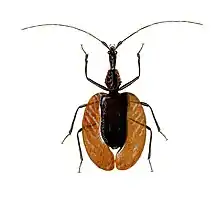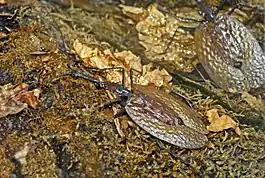Mormolyce phyllodes
Mormolyce phyllodes, commonly known as the violin beetle, is a species of ground beetles in the subfamily Lebiinae.[1][2]
| Mormolyce phyllodes | |
|---|---|
 | |
| Mormolyce phyllodes | |
| Scientific classification | |
| Domain: | Eukaryota |
| Kingdom: | Animalia |
| Phylum: | Arthropoda |
| Class: | Insecta |
| Order: | Coleoptera |
| Family: | Carabidae |
| Subfamily: | Lebiinae |
| Tribe: | Lebiini |
| Genus: | Mormolyce |
| Species: | M. phyllodes |
| Binomial name | |
| Mormolyce phyllodes Hagenbach, 1825 | |

Subspecies
The species may be divided into the following subspecies:[3][4]
- Mormolyce phyllodes borneensis Gestro, 1875
- Mormolyce phyllodes engeli Lieftinck & Wiebes, 1968
- Mormolyce phyllodes phyllodes Hagenbach, 1825
Description
Mormolyce phyllodes can reach a length of 60–100 millimetres (2.4–3.9 in).[5] These beetles possess a flat leaf-shaped, shiny black or brown body with distinctive violin-shaped translucent elytra (hence the common name). This characteristic mimicry protects them against predators, while their flat shaped body allow them to dwell in soil cracks or under the bark and leaves of trees. Head and pronotum are very elongated, with long antennae and the legs are long and slender.[5][6]
Both adults and larvae are predators, feeding on insect larvae. For defense purposes, they secrete poisonous butyric acid.[5][6] The larvae live between layers of bracket fungi, genus Polyporus. Their development lasts 8–9 months, while pupation lasts 8–10 weeks. Adults fly from August to November.[5]
Distribution and habitat
This species can be found in rainforests of Southeast Asia (Brunei, Indonesia, Java, Malaysia and Sumatra).[3]
References
- "Mormolyce phyllodes Hagenbach, 1825". Catalogue of Life. Retrieved 2023-04-09.
- Lorenz, Wolfgang (2021). "Carabcat Database". doi:10.48580/dfqf-3dk. Retrieved 2023-03-04.
- Biolib
- Lorenz, W. Nomina Carabideum, Online Database"
- "Carnivora Forum". Archived from the original on 2016-03-04. Retrieved 2015-08-24.
- Virtyal Zoo